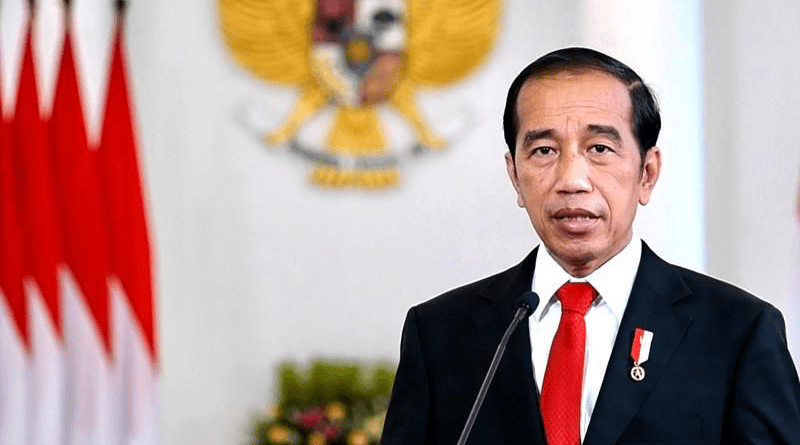Jokowi: Jakarta To Appeal WTO Ruling On Nickel Export Ban
By BenarNews
By Dandy Koswaraputra and John Bechtel
President Joko “Jokowi” Widodo said Wednesday that Indonesia would appeal a World Trade Organization ruling, which said Jakarta’s 2014 ban on nickel ore exports wasn’t justified because the country did not face a shortage of the metal.
The European Union (EU), which lodged a complaint before the WTO, had argued that the ban unfairly restricted steel producers’ access to the ore.
Indonesia, for its part, wants to add value to its metal reserves by attracting investments in the processing industry – the ore is smelted into nickel, a key component of batteries for electric cars.
“Once again, even though we lost at the WTO, it’s all right. I have told my ministers to appeal,” Jokowi said during a meeting with government officials in Jakarta and after the Geneva-based world trade body had issued its ruling earlier in the day.
In finding that the EU had made a case for exports, the 103-page WTO reportrecommended that Indonesia conform with its obligations under the General Agreement on Tariffs and Trade 1994.
It said the European bloc had demonstrated that the domestic processing requirement (DPR) “has a limiting effect on exports.”
“As such, the European Union has established a prima facie case that the DPR is inconsistent with … the GATT 1994, which Indonesia has not rebutted,” the report said.
“The panel has also found that the export ban is the most trade-restrictive measure that could be applied and that the DPR is highly trade restrictive,” the WTO said.
Jokowi said the value of Indonesia’s nickel exports had jumped to U.S. $20.8 billion (326.6 trillion rupiah) last year, from just $1.1 billion (17.3 trillion rupiah) in 2017, thanks to the government’s initiative to develop the domestic nickel processing industry.
While acknowledging that the ban had disrupted the supply of nickel to European countries, he said, “We also want to move forward. We want to achieve progress. We want to be a developed country and create jobs.
“If we relent because of a lawsuit, we are afraid, we take steps back, we will not become a developed country.”
The WTO panel said the ban was not justified because it is not temporarily applied “to prevent or relieve critical shortages of foodstuffs or other products essential to Indonesia.”
“[T]he panel finds that Indonesia has not demonstrated the existence of an imminent critical shortage of nickel ore, either low-grade or high-grade.”
Despite the ruling, Jokowi said the government was considering similar bans for other commodities such as bauxite and coffee.
A few days before the WTO issued its ruling, Luhut Pandjaitan, Indonesia’s coordinating minister for maritime affairs and investment, said the government had already started its appeal, but conceded it could take years, the Kumparan news website reported.
Mamit Setiawan, director of Energy Watch, a private watchdog group, urged the government to stick to its policy.
“We must not yield to them. This is our own natural wealth,” he told BenarNews.
“Why do we have to submit to rules that are detrimental to us? We should not give in to pressure just because we are a developing country.”
While acknowledging that Chinese companies control 90 percent of the nickel industry in Indonesia, Mamit said communities in the country were benefiting.
“The economy is flourishing in the regions. Jobs have been created. The European Union can invest in Indonesia if they want,” Mamit said.
Meanwhile, Muhammad Andri Perdana, a researcher at the Center of Economic and Law Studies, warned that WTO was unlikely to reverse its decision.
“As a member of the WTO, Indonesia must be prepared to accept the consequences if it continues its protectionist policy on nickel ore exports,” Andri told BenarNews.
“Nickel downstreaming has had a very good impact on Indonesia’s bargaining power, but it cannot be denied that the speed with which it has been implemented in recent years has been costly not only financially, but also socially and environmentally,” he said.
Downstreaming refers to encouraging domestic processing of the ore.
Tesla deal
The domestic processing industry is tied to Indonesia’s ambition of luring big-spending foreign investors, including the world’s richest person.
In May, Indonesian Investment Minister Bahlil Lahadalia said Elon Musk, chief executive of U.S. electric car maker Tesla, had agreed to invest in battery and electric vehicle manufacturing in Indonesia, after Musk and Jokowi met in Texas in the wake of the U.S.-ASEAN summit in Washington.
Two months later, Indonesian environmental groups wrote to Musk, urging him to not invest in nickel here.
“We are deeply concerned as our years of work teach us that the nickel industry is devastating to the environment, that indigenous peoples and environmentalists will be criminalized for opposing the destruction of their lands, and that there will be further violations of rights along the production chain,” they wrote in the letter.
More than 10,800 acres of rainforests in South Sulawesi had been destroyed because of pollution from nickel mining, while in Bungku Beach in Central Sulawesi, mining waste increased silt in nearby rivers and beaches, threatening the livelihood of local fishermen, according to the letter.
“Prohibit nickel sourced and produced in Indonesia in every business line of Tesla Inc. to prevent perpetuating the widespread damage to both the environment and communities in Indonesia,” it said.
In August, the Indonesian government announced that Tesla had signed contracts valued at about $5 billion to purchase nickel from two companies in Indonesia.
Tesla agreed to a five-year contract with nickel processing companies including Zhejiang Huayou, a Chinese mining company that operates plants in Morowali, a regency on Indonesia’s nickel-rich Sulawesi island, Luhut said at that time.
The government has set a goal for one fifth of vehicles made in Indonesia to be electric by 2025.
Pizaro Gozali Idrus in Jakarta contributed to this report.

